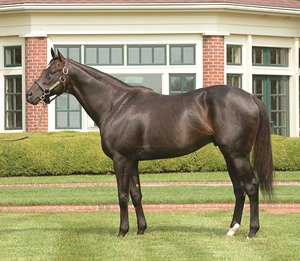Morning Line Dies Due to Complications From Pneumonia


The recent purchase of grade 1 winner Morning Line by A & A Ranch was seen as a substantial boost to the New Mexico breeding program. Tragically, the sire's potential would never be realized due to a rapidly advancing bout of pleuropneumonia that forced owner Fred Alexander to have him euthanized Jan. 28.
"For a market like ours, to get a grade 1 winner is pretty special," Alexander said. "We were excited and the breeders were excited about the new guy. He would have gotten the biggest book in the state. It was a shocker. It happened so fast."
Morning Line, a son of Tiznow , won the 2011 Carter Handicap (G1) and 2012 Mervyn LeRoy Handicap (G2) and was runner-up in the 2010 Breeders' Cup Dirt Mile (G1) and 2011 Donn Handicap (G1). He also won the Pennsylvania Derby (G2) in 2010. Out of 15 starts, he compiled a 5-4-2 record and earned $1,251,300 for various ownership groups. He was campaigned toward the end of his career by William S. Farish, Dixiana Stables, and Thoroughbred Legends Racing Stable.
Lane's End launched Morning Line's stud career in 2014 and stood him until he was sold to Alexander. To date, Morning Line has sired 38 winners, including black-type winners Surrender Now and Empire Line and grade 1-placed winner Seven Trumpets.
The stallion arrived at A & A Ranch, near Anthony, N.M., Jan. 12 and Alexander spied trouble right away. He said Morning Line had a runny nose and was walking a little stiff, so he took the horse's temperature and discovered he had 104-degree fever. The farm's vet came out promptly and, using ultrasound, found fluid in Morning Line's lungs. Morning Line had only been at A & A Ranch about an hour before he was back on a trailer and sent to a veterinary clinic 20 minutes away.
Pleuropneumonia, known more commonly as "shipping fever," is a lower respiratory tract infection frequently caused by a mix of bacteria that overwhelms the pulmonary defense mechanisms, according to a presentation by Dr. Steeve Giguère for an American Association of Equine Practitioners Focus Meeting.
"It was a rollercoaster," Alexander said. "We thought we caught it early, so I was optimistic, then something else would pop up and the clinic would get that under control and I'd get optimistic again. Finally, it got to be too much."
Morning Line's case appeared to have been particularly difficult to treat because the strains of bacterium causing his infection did not seem particularly affected by the antibiotics, Alexander was told by his vet.
"I guess it wasn't meant to be," Alexander said. "It is a tough business."
